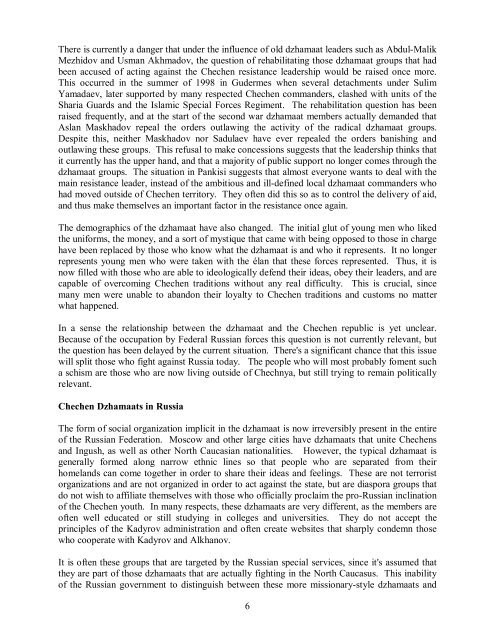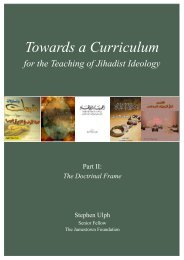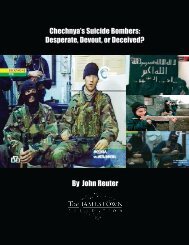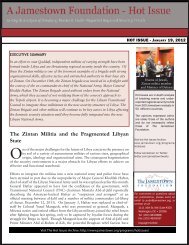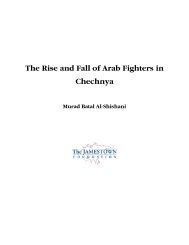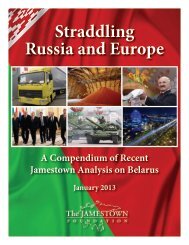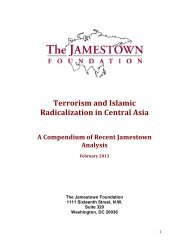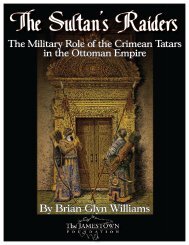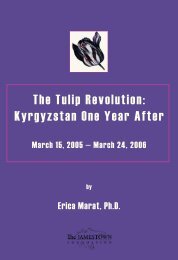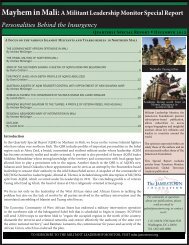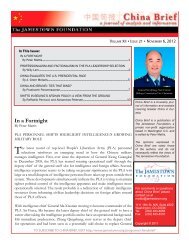The Chechen Resistance: Yesterday, Today and Tomorrow
The Chechen Resistance: Yesterday, Today and Tomorrow
The Chechen Resistance: Yesterday, Today and Tomorrow
- No tags were found...
You also want an ePaper? Increase the reach of your titles
YUMPU automatically turns print PDFs into web optimized ePapers that Google loves.
<strong>The</strong>re is currently a danger that under the influence of old dzhamaat leaders such as Abdul-MalikMezhidov <strong>and</strong> Usman Akhmadov, the question of rehabilitating those dzhamaat groups that hadbeen accused of acting against the <strong>Chechen</strong> resistance leadership would be raised once more.This occurred in the summer of 1998 in Gudermes when several detachments under SulimYamadaev, later supported by many respected <strong>Chechen</strong> comm<strong>and</strong>ers, clashed with units of theSharia Guards <strong>and</strong> the Islamic Special Forces Regiment. <strong>The</strong> rehabilitation question has beenraised frequently, <strong>and</strong> at the start of the second war dzhamaat members actually dem<strong>and</strong>ed thatAslan Maskhadov repeal the orders outlawing the activity of the radical dzhamaat groups.Despite this, neither Maskhadov nor Sadulaev have ever repealed the orders banishing <strong>and</strong>outlawing these groups. This refusal to make concessions suggests that the leadership thinks thatit currently has the upper h<strong>and</strong>, <strong>and</strong> that a majority of public support no longer comes through thedzhamaat groups. <strong>The</strong> situation in Pankisi suggests that almost everyone wants to deal with themain resistance leader, instead of the ambitious <strong>and</strong> ill-defined local dzhamaat comm<strong>and</strong>ers whohad moved outside of <strong>Chechen</strong> territory. <strong>The</strong>y often did this so as to control the delivery of aid,<strong>and</strong> thus make themselves an important factor in the resistance once again.<strong>The</strong> demographics of the dzhamaat have also changed. <strong>The</strong> initial glut of young men who likedthe uniforms, the money, <strong>and</strong> a sort of mystique that came with being opposed to those in chargehave been replaced by those who know what the dzhamaat is <strong>and</strong> who it represents. It no longerrepresents young men who were taken with the élan that these forces represented. Thus, it isnow filled with those who are able to ideologically defend their ideas, obey their leaders, <strong>and</strong> arecapable of overcoming <strong>Chechen</strong> traditions without any real difficulty. This is crucial, sincemany men were unable to ab<strong>and</strong>on their loyalty to <strong>Chechen</strong> traditions <strong>and</strong> customs no matterwhat happened.In a sense the relationship between the dzhamaat <strong>and</strong> the <strong>Chechen</strong> republic is yet unclear.Because of the occupation by Federal Russian forces this question is not currently relevant, butthe question has been delayed by the current situation. <strong>The</strong>re's a significant chance that this issuewill split those who fight against Russia today. <strong>The</strong> people who will most probably foment sucha schism are those who are now living outside of Chechnya, but still trying to remain politicallyrelevant.<strong>Chechen</strong> Dzhamaats in Russia<strong>The</strong> form of social organization implicit in the dzhamaat is now irreversibly present in the entireof the Russian Federation. Moscow <strong>and</strong> other large cities have dzhamaats that unite <strong>Chechen</strong>s<strong>and</strong> Ingush, as well as other North Caucasian nationalities. However, the typical dzhamaat isgenerally formed along narrow ethnic lines so that people who are separated from theirhomel<strong>and</strong>s can come together in order to share their ideas <strong>and</strong> feelings. <strong>The</strong>se are not terroristorganizations <strong>and</strong> are not organized in order to act against the state, but are diaspora groups thatdo not wish to affiliate themselves with those who officially proclaim the pro-Russian inclinationof the <strong>Chechen</strong> youth. In many respects, these dzhamaats are very different, as the members areoften well educated or still studying in colleges <strong>and</strong> universities. <strong>The</strong>y do not accept theprinciples of the Kadyrov administration <strong>and</strong> often create websites that sharply condemn thosewho cooperate with Kadyrov <strong>and</strong> Alkhanov.It is often these groups that are targeted by the Russian special services, since it's assumed thatthey are part of those dzhamaats that are actually fighting in the North Caucasus. This inabilityof the Russian government to distinguish between these more missionary-style dzhamaats <strong>and</strong>6


